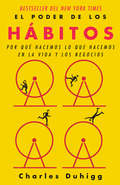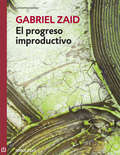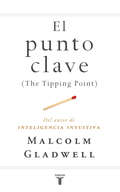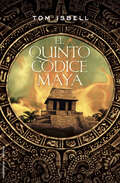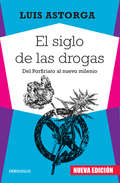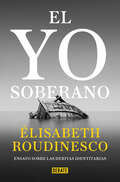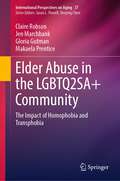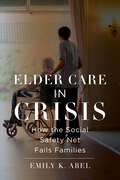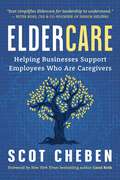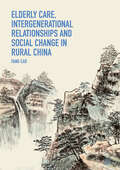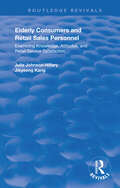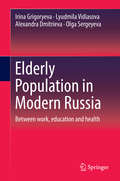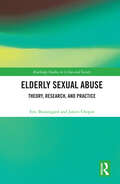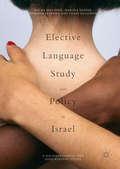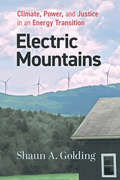- Table View
- List View
El poder de los hábitos: Por qué hacemos lo que hacemos en la vida y los negocios
by Charles Duhigg“Hay pocos libros que se convierten en manuales esenciales de vida. Este es uno de ellos”. — Financial Times En El poder de los hábitos, el premiado periodista Charles Duhigg nos lleva al límite de los descubrimientos científicos que explican por qué existen los hábitos, cómo nos condicionan y cómo cambiarlos. Duhigg ofrece una gran cantidad de información en una fascinante narrativa que nos lleva a las salas de reuniones de Procter & Gamble, a las gradas de la NFL, y hasta al movimiento por los derechos civiles, y presenta una manera completamente nueva de entender la naturaleza humana y su potencial. En esencia, El poder de los hábitos contiene un mensaje estimulante: la clave para hacer ejercicio con regularidad, perder peso, ser más productivo y conseguir el éxito consiste en entender el modo en que funcionan los hábitos. Como demuestra Duhigg, si somos capaces de sacar partido a este nuevo método, conseguiremos transformar nuestra vida laboral, social y personal.
El primer amor
by Agustín Elipe«Descubre las pasiones humanas en este libro.» Éxito o fracaso, amor, odio, deseo, ganas de vivir, etc. Las pasiones nos impulsan, incluso en ocasiones nos arrastran. <P><P> ¿Somos meros títeres del destino, efecto de las circunstancias? ¿Cómo se produce la singular historia de cada uno? Según ejercen su función los padres condiciona en gran medida el desarrollo, el futuro e incluso la patología de los hijos. <P> La mayoría hace lo que puede, pero no siempre disponen de información suficiente para realizar su función. Desde el nacimiento, nuestra existencia se basa en un continuo aprender. Hemos de aprenderlo prácticamente todo, a manejarnos con el cuerpo, con el lenguaje, con las relaciones, con el trabajo. <P> Y ¿A vivir?, ¿Es esta una sabiduría sólo asequible a golpe de experiencia?, y, en todo caso, para esa experiencia, ¿de qué ayuda podemos disponer? <P> Tener en cuenta algunas cosas nos puede ayudar a decidir, a elegir,a encontrar otra salida. También a comprender lo que nos pasa y por qué. Espero que este libro pueda ayudarte en tu andadura.
El progreso improductivo
by Gabriel ZaidEl cielo que nos tiene prometido el progreso, no acaba nunca de llegar.Una gran parte de la población vive en el limbo o en el purgatorio o el infierno: al margen de una vida mejor o descontenta de sus efectos contraproducentes. Ningún progreso parece hoy más urgente que la autocrítica del progreso. Este libro merece ser leído y estudiado por todos. No sólo ataca por igual los dogmas del neocapitalismo y los del (pseudo) socialismo. Propone un modelo de desarrollo diferente. Octavio Paz Hace muchos años, Monterroso dijo que si Borges escribiera en inglés devoraríamos sus obras en malas traducciones. Este parece ser el caso de El progreso improductivo. No es fácil aceptar una obra escrita por un mexicano en la tradición de Adam Smith, Gunnar Myrdal, Kenneth Galbraithy Robert Heilbroner; es decir, una obra bien escrita, que hace gala de imaginación, cultura y dominio de recursos literarios y, sobre todo, desu capacidad analítica. Adalberto García Rocha El cielo que nos tiene prometido el progreso no acaba nunca de llegar. Una gran parte de la población vive en el limbo o en el purgatorio o el infierno: al margen de una vida mejor o descontenta de sus efectos contraproducentes. Ningún progreso parece hoy más urgente que la autocrítica del progreso. Este libro merece ser leído y estudiado por todos. No sólo ataca por igual los dogmas del neocapitalismo y los del (pseudo) socialismo. Propone un modelo de desarrollo diferente. Octavio Paz. Hace muchos años, Monterroso dijo que si Borges escribiera en inglés,devoraríamos sus obras en malas traducciones. Este parece ser el caso de El progreso improductivo, no es fácil aceptar una obra escrita por un mexicano en la tradición de Adam Smith, Gunnar Myrdal, Kenneth Galbraithy Robert Heilbroner; es decir, una obra bien escrita, que hace gala de imaginación, cultura y dominio de recursos literarios y, sobre todo, de su capacidad analítica. Adalberto García Rocha
El punto clave (The Tipping Point): The Tipping Point
by Malcolm Gladwell¿Cómo surgen las epidemias, las modas, los éxitos de venta, el fenómeno de boca a boca o cualquiera de esos pequeños cambios que sacuden nuestra vida cotidiana al provocar grandes efectos? En esta obra revolucionaria que ocupa desde hace años los primeros puestos en las listas de ventas de Estados Unidos, Gladwell, un auténtico gurú de los negocios, analiza la trayectoria de varios productos y tendencias de gran éxito hasta descubrir cómo y por qué se alcanza el punto de inflexión a partir del cual algo se convierte en un fenómeno de masas: el punto clave. Gladwell nos presenta a personas responsables de difundir nuevas ideas y tendencias y examina la moda, los programas infantiles de televisión, la conducta de los fumadores y hasta la publicidad directa, con el fin de dilucidar el proceso del contagio de ideas . «La mejor forma de entender los cambios misteriosos que jalonan nuestra vida cotidiana (ya sea la aparición de una tendencia en la moda, el retroceso de las oleadas de crímenes, la transformación de un libro desconocido en un éxito de ventas, el aumento del consumo de tabaco entre los adolescentes, o el fenómeno del boca a oreja) es tratarlos como puras epidemias. Las ideas, los productos, los mensajes y las conductas se extienden entre nosotros igual que los virus.»Malcolm Gladwell Reseñas:«Malcolm Gladwell, escritor de éxito masivo, se ha convertido en uno de los grandes especialistas de nuestro tiempo en iluminar las zonas de sombra con su mezcla de periodismo, estudios científicos, historia y filosofía. Amante de llevar la contraria [...] Su objetivo es colocar junto a la certeza un signo de interrogación. [...]Gladwell define su trabajo como "no ficción pop". [...] Es uncheerleader de las ciencias sociales. [...] A la vista de los millones de lectores que han devorado sus libros, cabría decir que hay algo tranquilizador en ver ideas confirmadas por los estudios citados. También es curioso y seductor.»El País Semanal «Un mago en los libros de autoayuda. [...] Con más de 10 millones de ejemplares vendidos, MalcolmGladwell es uno de los principales escritores "motivacionales", gurú del éxito y analista de "estrategias para triunfar". El punto clave, Inteligencia intuitiva, Lo que vio el perro y Fueras de serie son libros que ejecutivos y líderes de todo tipo devoran en los aeropuertos.»La Gaceta de los negocios «Cualquier persona interesada en tendencias debería leer El punto clave.»US Magazine «Una lectura tremendamente gratificante.»The Seattle Times «Un tratado de lo más original que le mantendrá despierto.»Business Week «Gladwell tiene una gran habilidad para transmitir teorías complejas en prosa clara y elegante, y es un guía de lo más carismático.»San Francisco Chronicle «Un estudio ameno, oportuno y atractivo de las modas. Gladwell tiene un don para explicar claramente los experimentos psicológicos.»Alan Wolfe, The New York Times Book Review
El quinto códice maya
by Tom IsbellEl quinto códice Maya es un thriller lleno de acción y aventura en torno a un códice relacionado con las predicciones mayas sobre el fin del mundo. Scott Daggart, un antropólogo estadounidense especializado en la cultura maya y profesor de la universidad de Chicago, además de militar retirado, se encuentra pasando el verano en el Yucatán, en las inmediaciones de Playa del Carmen, embarcado en la excavación de un yacimiento arqueológico. Scott intenta superar la muerte de su esposa, asesinada poco antes en Chicago en el transcurso de un robo. Un día, sorpresivamente, recibe la llamada de Lyman Tingley, un antiguo amigo y colega con el que perdió el contacto tiempo atrás. Tingley, un ambicioso antropólogo, ha conseguido fama internacional al anunciar el descubrimiento del Quinto Códice, uno de los escasísimos libros mayas que se salvaron de la quema a la que los conquistadores y el clero españoles sometieron las bibliotecas indígenas a su llegada al Nuevo Mundo.Daggart se ve a partir de ese momento involucrado en una sucesión de aventuras y conspiraciones en su lucha por evitar que el manuscrito sea utilizado para fines terroristas.
El secreto: Lo que saben y hacen los grandes líderes
by Ken BlanchardEn esta nueva edición de su clásica fábula de negocios, Ken Blanchard y Mark Miller se convierten en el corazón de lo que hace que un líder sea exitoso. La joven ejecutiva Debbie Brewster, recientemente promovida pero luchadora, le pregunta a su mentor la única pregunta que necesita desesperadamente: "¿Cuál es el secreto de los grandes líderes?" Su respuesta - "los grandes líderes sirven" - la impresiona, pero con el tiempo revela las cinco formas fundamentales que los líderes tengan éxito a través del servicio. En el camino ella aprende: • Por qué los grandes líderes parecen estar preocupados por el futuro• Cómo la gente en el equipo finalmente determina tu éxito o fracaso• Qué tres arenas requieren una mejora continua• ¿Por qué el verdadero éxito en el liderazgo tiene dos componentes esenciales?• Cómo fortalecer intencionalmente o inconscientemente la credibilidad del liderazgo La edición del décimo aniversario incluye una autoevaluación de liderazgo para que los lectores puedan medir hasta qué punto lideran sirviendo y dónde pueden mejorar. Los autores también han agregado respuestas a las preguntas más frecuentes sobre cómo aplicar el modelo SERVE en el mundo real.Tan práctico como alentador, The Secret comparte la sabiduría de Blanchard y Miller sobre el liderazgo en una forma que cualquiera puede comprender e implementar fácilmente. Este libro beneficiará no solo a aquellos que lo lean, sino también a las personas que buscan orientación y las organizaciones a las que sirven.
El secreto: Lo que saben y hacen los grandes líderes
by Thomas NelsonEn esta nueva edición de su clásica fábula de negocios, Ken Blanchard y Mark Miller se convierten en el corazón de lo que hace que un líder sea exitoso. La joven ejecutiva Debbie Brewster, recientemente promovida pero luchadora, le pregunta a su mentor la única pregunta que necesita desesperadamente: "¿Cuál es el secreto de los grandes líderes?" Su respuesta - "los grandes líderes sirven" - la impresiona, pero con el tiempo revela las cinco formas fundamentales que los líderes tengan éxito a través del servicio. En el camino ella aprende: • Por qué los grandes líderes parecen estar preocupados por el futuro• Cómo la gente en el equipo finalmente determina tu éxito o fracaso• Qué tres arenas requieren una mejora continua• ¿Por qué el verdadero éxito en el liderazgo tiene dos componentes esenciales?• Cómo fortalecer intencionalmente o inconscientemente la credibilidad del liderazgo La edición del décimo aniversario incluye una autoevaluación de liderazgo para que los lectores puedan medir hasta qué punto lideran sirviendo y dónde pueden mejorar. Los autores también han agregado respuestas a las preguntas más frecuentes sobre cómo aplicar el modelo SERVE en el mundo real.Tan práctico como alentador, The Secret comparte la sabiduría de Blanchard y Miller sobre el liderazgo en una forma que cualquiera puede comprender e implementar fácilmente. Este libro beneficiará no solo a aquellos que lo lean, sino también a las personas que buscan orientación y las organizaciones a las que sirven.
El siglo de las drogas (nueva edición): Del porfiriato al nuevo milenio
by Luis AstorgaUna nueva edición de una investigación clásica acerca los fármacos prohibidos y la historia de sus usos, las percepciones y las relaciones con los diferentes agentes sociales, desde la época porfiriana hasta nuestros días.Su autor, Luis Astorga, prestigiado investigador y analista del tema, critica de forma abierta la manera prejuiciosa y desinformada de abordarlo, y plantea posibles escenarios del futuro.A veinte años de la publicación de El siglo de las drogas, su pertinencia no puede ser mayor. Las menciones sobre el negocio de las drogas ilegalizadas abundan en la prensa: las disputas entre miembros de organizaciones criminales, la alarmante situación de las cárceles, las acciones violentas de sicarios y la reestructuración de los territorios de venta de sustancias psicoactivas ilícitas. El panorama sigue siendo complicado. Los políticos insisten en que el crimen organizado amenaza la seguridad nacional, aunque a muchos de ellos les conviene su fortalecimiento. Los institutos contra las adicciones se ven limitados por la falta de recursos, y el ciudadano común padece la falta de información de primera mano.La "guerra contra las drogas" se puede volver una guerra interminable porque delincuencia y poder político han estado unidos históricamente, pero también porque la concepción que se tiene del fenómeno de la venta y el consumo varía de acuerdo con la época donde se ubica. Nuestra visión de drogas como la mariguana, la cocaína y las derivadas del opio cambia al mismo tiempo que nuestra realidad. En este contexto, Luis Astorga presenta un recorrido histórico que va desde el Porfiriato hasta la actualidad sobre los usos, las percepciones y el tráfico de esas sustancias y presenta interrogantes sobre los posibles escenarios del futuro: si la guerra está perdida de antemano, ¿sólo nos queda su legalización?
El teólogo en la España de la temprana modernidad: Formas de vida seculares y espirituales. Impacto político, social y estético (Prolegomena Romanica. Beiträge zu den romanischen Kulturen und Literaturen)
by Christoph Strosetzki Isabel Hernando Morata Christian WehrEste volumen analiza el lugar y el perfil del teólogo en el Siglo de Oro español. Los capítulos que lo integran se centran no solo en los miembros del clero católico, sino también en los seguidores de corrientes religiosas como el recogimiento, el dejamiento, el alumbradismo y la devotio moderna. La figura del teólogo se aborda desde las perspectivas de los estudios literarios y culturales, la teología y la filosofía. Son objeto de atención la concepción que el teólogo tenía de sí mismo, su actitud, conocimiento, formación, influencias y actividades, que atestiguan los tratados, los textos ficcionales y la literatura religiosa del Siglo de Oro. Se plantean cuestiones como las consecuencias de la Reforma y la Contrarreforma en la imagen de los teólogos, sus relaciones familiares y económicas con otros miembros de la sociedad, y el importante papel que alcanzaron en este período como autores literarios.Dieser Sammelband analysiert den gesellschaftlichen Ort und das Profil des Theologen im Siglo de Oro, wobei auch Vertreter religiöser Lehren, die nicht dem katholischen Klerus angehörten, also Repräsentanten der Strömungen des recogimiento, dejamiento, alumbradismo oder der devotio moderna Berücksichtigung finden. Es kommen die Perspektiven vor allem von Literatur- und Kulturwissenschaft, Theologie und Philosophie zu Wort. Analysiert werden Selbstverständnis, Haltung, Wissen und Ausbildung, Einflussbereich und Tätigkeitsfeld der Theologen, wie sie in Traktaten, fiktionalen Texten und religiöser Literatur bezeugt werden. Dabei werden Fragenkomplexe diskutiert wie z.B. die nach den Folgen von Reformation und Gegenreformation für das Selbstverständnis des Theologen, nach den familiären und wirtschaftlichen Bindungen der Theologen oder nach der bedeutenden Rolle von Theologen als Autoren in der Literatur der Zeit.
El yo soberano: Ensayo sobre las derivas identitarias
by Elisabeth RoudinescoUna reflexión valiente y audaz sobre las trampas de la política de la identidad, clave para entender el estado el mundo de hoy. El fenómeno de la «asignación de identidad» ha ido tomando fuerza en los últimos veinte años, hasta el punto de involucrar a la sociedad en su conjunto. Así lo atestiguan la evolución de la noción de género y las metamorfosis de la idea de raza. ¿Qué ha pasado para que los compromisos emancipatorios del pasado, en particular las luchas anticoloniales y feministas, hayan se hayan replegado sobre sí mismos de tal manera? El derribo de estatuas en nombre del antirracismo es desconcertante, y la violencia con la que se manifiesta el odio a los hombres en el seno de la lucha feminista plantea interrogantes. En décadas recientes, se han reinterpretado hasta el exceso instrumentos de pensamiento ricos y de gran fineza —de las obras de Sartre, Beauvoir, Lacan, Césaire, Foucault, Deleuze o Derrida— para sostener unos ideales nuevos cuya prioridad no es alcanzar una sociedad más justa. En paralelo, la noción de identidad nacional regresa en los discursos de la extrema derecha, habitados por el terror. Estos valoran lo que los identitarios del otro lado rechazan: la identidad blanca, masculina, viril, colonialista, occidental. Identidad contra identidad, por tanto. En esta reflexión valiente y audaz sobre las trampas de las políticas identitarias, clave para entender el mundo de hoy, Élisabeth Roudinesco ofrece algunas pistas para huir del laberinto de la esencialización de la diferencia y de lo universal. La crítica ha dicho:«Una investigación inspirada en la obsesión contemporánea de asignar una identidad a cada persona: un manual de progresismo pragmático».Le Monde «Una obra notablemente investigada que analiza, con talento y meticulosidad, la naturaleza y los peligros de las derivas identitarias, dondequiera que surjan. No era fácil entrelazar los hilos que unen los debates sobre la identidad, el Islam, la República, el colonialismo, etc., para dar sentido a los cambios contemporáneos en la relación con la alteridad. Como historiadora, pero con todos los recursos de las ciencias sociales, la autora consigue el tour de force de arrojar luz sobre el asunto con una coherencia que sorprenderá a la mayoría de los lectores».Nonfiction
Elastic Language
by Grace Q. ZhangElastic language carries non-specific and stretchable meaning, as in 'He loves her, kind of'. It is used like a slingshot, targeting various strategic goals. Consolidating current research and charting new directions, this book develops a refreshing theory of elasticity, empirically attested by natural language data from tension-prone encounters between Australian Customs officers and passengers. The theory proposes three principles (fluidity, stretchability and strategy) and offers a systematic look at how elastic language, as a sliding scale, works to balance strengthening and weakening speech tones, to firm and soften a speaker's stance, and to reveal and evade the truth. The comparative analysis of forms, functions, and context confirms that elastic language is fluid, stretchable, and strategic. It serves both cooperative and competitive functions, and social and speech factors impact on its use. This book will appeal to students and researchers working in pragmatics, applied linguistics, sociolinguistics, discourse analysis, and communication.
Elastizität organisieren: Formen und Funktionen von Stellvertretungen in Organisationen (Organisationssoziologie)
by Martin VogelWozu Stellvertretung in Organisationen? – diese Frage ist trivial: Schließlich ist jede/r einmal krank oder im Urlaub. Wenn dann niemand einspringen kann, kann das weitreichende Folgen haben. Wozu also noch diese Studie? – Weil die Frage trivial ist bzw. weil es interessant ist zu beobachten, wie es (in) einem gegebenen Kontext gelingt, ein Phänomen so erscheinen zu lassen, als sei es trivial. Dieser Band leistet einerseits einen Beitrag zum Verständnis von Stellvertretung in Organisationen: die Klärung des Begriffs, die Einordnung von Stellvertretung als organisationale Struktur und die Ermittlung ihrer Funktionen. Zum anderen unterstützt Martin Vogel die Forderung, systemtheoretische Forschung „empiriefähiger“ zu machen und stellt hierfür eine Forschungsheuristik zur Diskussion. Der Titel „Elastizität organisieren“ rückt ein Konzept Niklas Luhmanns ins Zentrum. Mit Hilfe ihrer Stellen können Organisationen auf sich ändernde Umweltbedingungen reagieren, indem sie Stellen neu schaffen, umwidmen, einsparen oder von Beginn an „ambivalent“ programmieren. Das Buch stellt Stellvertretungen als Beispiel dieser „Ambivalenzstrategie“ vor: Auf der Rückseite ihrer trivialen Funktion dienen sie als voraussetzungsvolle „elastische“ Lösung für vielfältige organisationale Probleme.Elastizität zu organisieren ist kein triviales Geschäft.
Elder Abuse in the LGBTQ2SA+ Community: The Impact of Homophobia and Transphobia (International Perspectives on Aging #37)
by Gloria Gutman Claire Robson Jen Marchbank Makaela PrenticeThis book describes and analyzes the lived experience of elder abuse from the queer community. It discusses the experiences by transwomen, gay men and lesbians of financial abuse, physical and sexual abuse, homophobic abuse, and neglect within partner relationships, residential care, in home care, and religious organizations. Queer and trans elders have been described as ‘The Silent Generation’, since they have lived through times when their sexual and gender identities were criminalized and pathologized. The book shows that they are far more at risk to suffer abuse and neglect by those they should be able to trust, since they are more likely to have encountered all key risk factors, such as isolation, previous abuse and trauma, and mistrust of the health care system. Their vulnerability has been overlooked and this book addresses that gap. As such, this book provides a great resource to anyone working with elders, including medical professionals, care providers, police, counsellors, and policy makers.
Elder Care in Crisis: How the Social Safety Net Fails Families (Health, Society, and Inequality #2)
by Emily K. AbelExplains why there is a crisis in caring for elderly people and how the COVID-19 pandemic exacerbated itBecause government policies are based on an ethic of family responsibility, repeated calls to support family members caring for the burgeoning elderly population have gone unanswered. Without publicly funded long-term care services, many family caregivers cannot find relief from obligations that threaten to overwhelm them. The crisis also stems from the plight of direct care workers (nursing home assistants and home health aides), most of whom are women from racially marginalized groups who receive little respect, remuneration, or job security. Drawing on an online support group for people caring for spouses and partners with dementia, Elder Care in Crisis examines the availability and quality of respite care (which provides temporary relief from the burdens of care), the long, tortuous process through which family members decide whether to move spouses and partners to institutions, and the likelihood that caregivers will engage in political action to demand greater public support. When the pandemic began, caregivers watched in horror as nursing homes turned into deathtraps and then locked their doors to visitors. Terrified by the possibility of loved ones in nursing homes contracting the disease or suffering from loneliness, some caregivers brought them home. Others endured the pain of leaving relatives with severe cognitive impairments at the hospital door and the difficulties of sheltering in place with people with dementia who could not understand safety regulations or describe their symptoms. Direct care workers were compelled to accept unsafe conditions or leave the labor force. At the same time, however, the disaster provided an impetus for change and helped activists and scholars develop a vision of a future in which care is central to social life.Elder Care in Crisis exposes the harrowing state of growing old in America, offering concrete solutions and illustrating why they are necessary.
Eldercare Work in Contemporary China: The Nexus of State, Family, and Market
by Zhe YanThis book gives voice to an indispensable yet often overlooked group of care workers in China&’s eldercare industry. Drawing on rich, first-hand accounts from frontline care workers and interwoven with a wealth of sociological insights, the author offers a critical yet nuanced analysis of how statutory norms, cultural values, institutional standards, and interpersonal dynamics shape the experiences, motivations, and coping strategies of professional care workers. The book compellingly illustrates the stark contrast between the high expectations and demands placed upon these workers and the low pay and status they receive in return. A key strength of the book lies in its holistic approach, which not only contextualizes the challenges faced by care workers but also explores their search for meaning within an increasingly marketized and rapidly evolving cultural landscape. By shedding light on the intersection of care work, policy, economy and socio-cultural values, the book offers a fresh analytical lens on the precariousness and resilience of care workers. It provides critical insights into how these workers navigate structural constraints, drawing on personal agency and cultural resources to find purpose and dignity in their roles. In doing so, the book makes a significant contribution to debates on labor, aging, and care in contemporary China, offering valuable implications for policymakers, researchers, and practitioners alike.
Eldercare: Helping Businesses Support Employees Who Are Caregivers
by Scot ChebenIn today's multigenerational workforce, supporting employee caregivers isn't just compassionate-it's essential for sustainability and success.When your employees assume caregiving roles outside of the workplace, it affects staff retention and attention, and therefore, your bottom line. As more and more people live longer and with myriad health limitations, many businesses have failed to keep pace. It's imperative to put proper infrastructure in place to support caregiving employees. Eldercare: Helping Businesses Support Employees Who Are Caregivers seeks to help employers cope with the complex situations arising for those who need to care for their aging loved ones. It offers practical advice, including: Why it is important for businesses to know the facts about caregiving The financial effects for employees The rules and guidelines of the Family and Medical Leave Act (FMLA) How your business can help its employees External help and resources Safeguard employee retention and a healthy workplace culture while ensuring continued profitability by providing resources and benefits to your caregiving employees. Help them manage the overwhelm of balancing caregiving and work, and you will both thrive.
Elderly Care, Intergenerational Relationships and Social Change in Rural China
by Fang CaoThis book investigates how rapid socio-political-economic change in China since 1949 has affected intergenerational relationships and practices in rural areas, specifically the care provided to elderly parents by their adult children. It focuses on the lived experiences of rural villagers and their perceptions of the impact of these socio-political changes on intergenerational relationships, care of the elderly, family cohesion, and the traditional value of filial piety. It notably considers the importance of filial piety as a dominant family value, the conflict between strong family bonds and growing desires for individuality and autonomy, the prevalence of migrant work among adult children and the diversification of intergenerational practices, alongside the need for national policy and services development for residential and community-based aged care in rural China.
Elderly Consumers and Retail Sales Personnel: Examining Knowledge, Attitudes and Retail Service Satisfaction
by Julie Johnson-Hillery Jikyeong KangOriginally published in 1997. Based around the author's observations and experiences in the fashion retailing industry and later dissertation research, this study looks at the attitudes of retailers towards the elderly. The aim of the research presented is to challenge stereotypes, suggest practical ways in which improve service for the aging population and identify areas where retailers could improve customer service across all consumer groups as well as the older age groups.
Elderly Population in Modern Russia: Between Work, Education And Health
by Irina Grigoryeva Lyudmila Vidiasova Alexandra Dmitrieva Olga SergeyevaThis book compares the wellbeing of older Russian adults in the EU, USA, China, Japan, and Russia. Through providing a general overview of population ageing, social, economic and IT-literacy among older Russian adults, it fills the gap in quality of life research in developing and transition societies. The topic is revealed in the context of the modern elderly’s changing identity, their life plans, and intergenerational relations. The connection between ageism and sexism are identified and interpreted, thereby using comparative materials on different countries. The book discusses the issue of educating the elderly in a new direction—namely, the use of ICTs. It also presents the result of studies on pension reform discussions over social networks, which illuminate the social response to the political, social, and economic agenda. As such this book will be a valuable read to researchers specialized in aging, gender studies, quality of life studies, Russian studies, ICT adoption studies, and to those studying the social transformation of Russia, Eastern Europe, the BRICS countries, which face similar problems with aging.
Elderly Sexual Abuse: Theory, Research, and Practice (Routledge Studies in Crime and Society)
by Eric Beauregard Julien ChopinThis book offers an analytical review of the state of knowledge on elderly sexual abuse and presents new data that will confront some of the accepted ideas and some of the myths associated with this specific form of sexual violence. Sexual violence research has often considered children to be the most vulnerable population. However, another population just as vulnerable to sexual abuse but often overlooked by researchers, is the elderly. Evidence shows that elderly victims are more likely to be attacked by strangers, most likely to be victimized in their own homes, and are usually less capable of resisting a physical attack. Drawing on a large and representative dataset, Elderly Sexual Abuse offers a full and theoretically informed picture of the offenders and their crimes. In addition to a specific chapter devoted to prevention and criminal investigation, the book also connects research to practice, exploring what the findings mean for professionals working with these cases and the criminal justice system. This book is essential reading for all those engaged with sexual violence, victimization, elder abuse, and vulnerable populations.
Elections and Democratization in the Philippines (Comparative Studies in Democratization)
by Jennifer FrancoFirst published in 2001. This study shows how legitimate elections held under centralized authoritarian conditions before 1986, though not democratic, still contributed to democratization by creating the political space needed for democratic oppostion to arise.
Elections as Popular Culture in Asia (Politics in Asia)
by Chua Beng HuatConventional political science depicts legitimate elections as rational affairs in which informed voters select candidates for office according to how their coherently presented aims, ideologies and policies appeal to the self-interest of the electorate. In reality elections, whether in first world democracies, or in the various governmental systems present in Asia, can more realistically be seen as cultural events in which candidates’ campaigns are shaped, consciously or unconsciously, to appeal to the cultural understanding and practices of the electorate. The election campaign period is one in which the masses are mobilized to participate in a range of cultural activities, from flying the party colours in noisy motorcycle parades to attending political rallies for or against, or simply to be entertained by the performances on the political stage, and to gambling on the outcome of the contest. The essays in this book analyse electioneering activities in nine Asian countries in terms of popular cultural practices in each location, ranging from updated traditional cultures to mimicry and caricatures of present day television dramas. In presenting political election as an expression of popular culture this book portrays electoral behaviour as a meaningful cultural practice. As such this book will appeal to student and scholars of political science and cultural studies alike, as well as those with a more general interest in Asian studies.
Elective Language Study and Policy in Israel
by Malka Muchnik Marina Niznik Anbessa Teferra Tania GluzmanThis book presents research on the instruction of two heritage languages and two foreign languages in Israeli schools. The authors explore language policy and the way languages are studied from the point of view of students, teachers, schools and curricula. Language in Israel is a loaded concept, closely linked to ideological, political, and social issues. The profound changes in language policy in the West along with two large waves of immigration from the Former Soviet Union and Ethiopia resulted in new attitudes towards immigrant languages and cultures in Israel. Are these new attitudes strong enough to change the language policy in the future? What do students and teachers think about the language instruction at school? Are the teaching materials updated and do they address modern demands? This book provides answers to these and other questions. As well as describing the instruction of two heritage languages, Russian and Amharic, and two foreign languages, French and Spanish, the book also contains an extensive background on the immigration history and acculturation process of the speakers of each of these languages. An in-depth understanding of the case of Israel will serve as a guide for other countries contending with similar issues pertaining to the adjustment of language policies in light of immigration and other challenging circumstances.
Electoral Systems and the Balance of Consumer-Producer Power
by Eric C. C. Chang Mark Andreas Kayser Drew A. Linzer Ronald RogowskiThis book investigates the effects of electoral systems on the relative legislative and, hence, regulatory influence of competing interests in society. Building on Ronald Rogowski and Mark Andreas Kayser's extension of the classic Stigler–Peltzman model of regulation, the authors demonstrate that majoritarian electoral arrangements should empower consumers relative to producers. Employing real price levels as a proxy for consumer power, the book rigorously establishes this proposition over time, within the OECD, and across a large sample of developing countries. Majoritarian electoral arrangements depress real prices by approximately ten percent, all else equal. The authors carefully construct and test their argument and broaden it to consider the overall welfare effects of electoral system design and the incentives of actors in the choice of electoral institutions.
Electric Mountains: Climate, Power, and Justice in an Energy Transition (Nature, Society, and Culture)
by Shaun A. GoldingClimate change has shifted from future menace to current event. As eco-conscious electricity consumers, we want to do our part in weening from fossil fuels, but what are we actually a part of? Committed environmentalists in one of North America’s most progressive regions desperately wanted energy policies that address the climate crisis. For many of them, wind turbines on Northern New England’s iconic ridgelines symbolize the energy transition that they have long hoped to see. For others, however, ridgeline wind takes on a very different meaning. When weighing its costs and benefits locally and globally, some wind opponents now see the graceful structures as symbols of corrupted energy politics. This book derives from several years of research to make sense of how wind turbines have so starkly split a community of environmentalists, as well as several communities. In doing so, it casts a critical light on the roadmap for energy transition that Northern New England’s ridgeline wind projects demarcate. It outlines how ridgeline wind conforms to antiquated social structures propping up corporate energy interests, to the detriment of the swift de-carbonizing and equitable transformation that climate predictions warrant. It suggests, therefore, that the energy transition of which most of us are a part, is probably not the transition we would have designed ourselves, if we had been asked.
